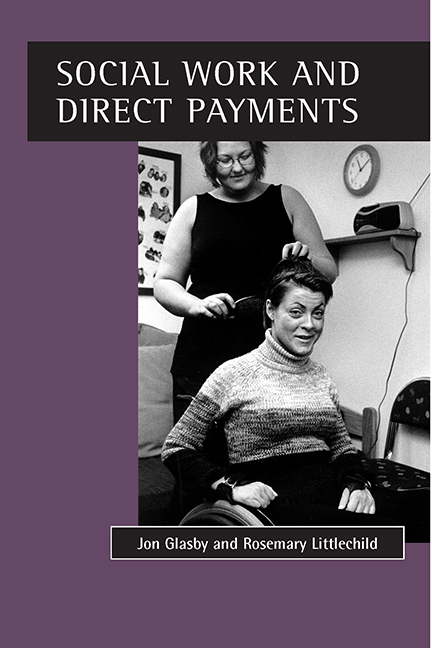Book contents
- Frontmatter
- Contents
- List of tables and boxes
- Foreword
- Acknowledgements
- List of abbreviations
- one Introduction
- two History
- three From indirect to direct payments I: legislation
- four From indirect to direct payments II: guidance and extension
- five The progress of direct payments
- six The experiences of different user groups
- seven The advantages of direct payments
- eight Possible difficulties
- nine Practical issues
- ten Conclusion: implications for community care
- Bibliography
- Appendix Useful resources
- Index
- Related reports from The Policy Press
seven - The advantages of direct payments
Published online by Cambridge University Press: 05 April 2022
- Frontmatter
- Contents
- List of tables and boxes
- Foreword
- Acknowledgements
- List of abbreviations
- one Introduction
- two History
- three From indirect to direct payments I: legislation
- four From indirect to direct payments II: guidance and extension
- five The progress of direct payments
- six The experiences of different user groups
- seven The advantages of direct payments
- eight Possible difficulties
- nine Practical issues
- ten Conclusion: implications for community care
- Bibliography
- Appendix Useful resources
- Index
- Related reports from The Policy Press
Summary
Research to date has highlighted a number of key advantages for recipients ofdirect payments. These include:
• more responsive services and increased choice and control(Hasler et al, 1999);
• improved morale and mental/psychological wellbeing(Glendinning et al, 2000a);
• a more creative use of resources which may sometimes reducecosts, but which certainly ensures better value for money (Zarb andNadash, 1994; DoH, 1998c).
• a blurring of the boundary between health and social care(Glendinning et al, 2000a).
Choice and control
It is now widely accepted that direct payments enhance choice and control,and this is often taken for granted without adequately assessing theevidence base. Certainly, all the available research suggests that directpayments are a major step forward, but supporters will need to return to theresearch findings in order to overcome continuing resistance, constantlymaking and re-making the case that direct payments enhance choice, controland independence.
In the early 1990s, research into the ILF revealed that making cash paymentsdirectly to service users gave a sense of control and choice that could notbe achieved via statutory services (see Box 38; Kestenbaum, 1993b; Lakey,1994). While respondents found directly provided services to be inflexible,costly and severely limited in terms of the availability and level ofservice on offer, they valued the freedom which ILF payments provided.Receiving money with which to employ their own care assistants enabled themto choose staff with whom they felt at ease and who they felt had the rightstrengths and skills. The disabled person could also employ someone of aparticular sex and select carers who spoke the same language as they did.Above all, however, ILF recipients valued being able to hire staff with whomthey felt able to develop a good relationship, choosing people with theright personality to make the care package work.
As a result of this, the disabled people were able to establish and maintainlonger lasting relationships with their staff and enjoyed greater continuityof personnel. At the same time, they were also able to create flexiblesupport arrangements to meet often fluctuating needs.
- Type
- Chapter
- Information
- Social Work and Direct Payments , pp. 85 - 98Publisher: Bristol University PressPrint publication year: 2002



